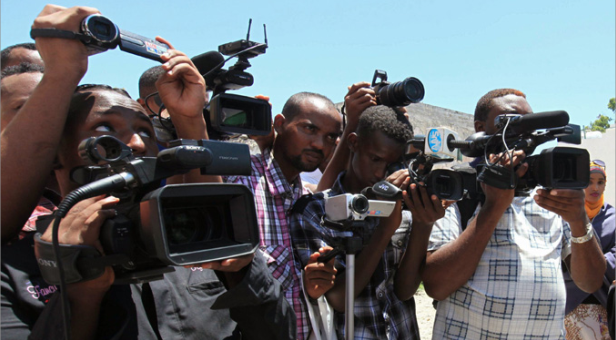
Amid a worldwide fight against the novel coronavirus( COVID-19) Pandemic, Gambian journalists and the Gambian Diaspora media practitioners are joining people around the globe in commemorating World Press Freedom Day on May 3.
The motto for this year’s 27th World Press Freedom Day, organised by UNESCO, is “Journalism without Fear or Favour.”
During the annual commemoration, organisations and individuals celebrate basic principles of press freedom, evaluate the state of press freedom worldwide, defend the media from attacks on their independence and pay tribute to journalists who have lost their lives.
Nearly 200 years ago, Thomas Jefferson third President of the United States of America wrote that “the only security of all is in a free press.” His words stand today as an apt reminder of the crucial link between press freedom and democracy.
During the current crisis, reporters on the frontlines reinforced every hour of every day why journalism matters.
However, journalists across the globe continue to be under attack. In dozens of countries, including the United States, journalists are decried as purveyors of “fake news.”
In many parts of the world, they are harassed, threatened, and jailed for indeterminate sentences.
During a global health crisis that has killed scores of thousands and left economic devastation in its wake, access to accurate and complete information is even more critical than ever.
Reporters Without Borders’ World Press Freedom Index shows that the number of countries where journalists are considered safe is on the decline.
In the time of coronavirus pandemic, the impediments to press freedom threaten to be even greater. Amid eroding press freedoms and threats to their physical safety, many journalists are under siege, yet they are more critical than ever as the world faces a historic crisis.
Journalists are facing crises on multiple fronts, exacerbated by the COVID19 pandemic. Reporters Without Borders released its 2020 World Press Freedom Index on April 21, noting that the coronavirus pandemic is being used by authoritarian governments to implement “shock doctrine” measures that would be impossible in regular times.
The COVID-19 epidemic has exposed the long-term risks of suppressing press freedoms. As the death toll mounts amidst an economic crisis of unprecedented proportions, promoting transparent reporting is a global necessity.
However, several countries stand accused of acting too late in warning the world about the timing and extent of the threat.
The Gambia has moved to 87 out of 180 countries surveyed in the 2020 World Press Freedom Index compiled by Reporters Without Borders (RSF).
In 2019, the country was ranked 92 out of 180 countries. “The Gambia has continued to progress despite some notable press freedom violations in 2019,” the RSF said in a statement. It told The Gambia had not registered any death of a journalist, citizen journalist or media assistant.
However, RSF said that “the old habits from 23 years of terror and suppression of press freedom have not yet entirely disappeared.
“Two privately-owned radio stations, King FM and Home Digital FM, were closed for a month in early 2020, and their managers were arrested for allegedly inciting hate in their coverage of protests organized by opposition political parties.”
RSF urged The Gambia government to overhaul draconian legislation that violates press freedom in the country. “In May 2018, the supreme court ruled that the criminalization of defamation was unconstitutional but, despite the good intentions expressed by Barrow, the long-awaited overhaul of legislation that violates press freedom has yet to materialize.”
At number 23, Namibia is the highest-ranked African country on the list, which features Nordic regions Norway, Finland, and Denmark in the top three spots, respectively.
The World Press Freedom Index illustrates the oppression of journalists from North to South, and a pandemic in its own right seems to have fomented.
Even the president of the world’s most powerful democracy has described the press as “the enemy of the people.”
Ultimately, the freedom of the media can only be guaranteed by a coordinated global effort, public awareness, and a focus on the long-term advantages of a more critical world.
This year’s World Press Freedom Day aims to do just that, under the theme of “Journalism Without Fear or Favour.” It calls for awareness on specific issues about the safety of journalists, their independence from political or commercial influence, and gender equality in all aspects of the media.
In the words of Albert Camus, “…without freedom, the press will never be anything but bad.”
Ahead of World Press Freedom Day 2020 on May 3, the UN Special Rapporteur on Freedom of Expression, David Kaye, calls on gov’t to ensure the independence of journalism, saying reporters must be allowed to work without fear or favor – particularly during the COVID-19 crisis.
By Alagi Yorro Jallow











Recent Comments